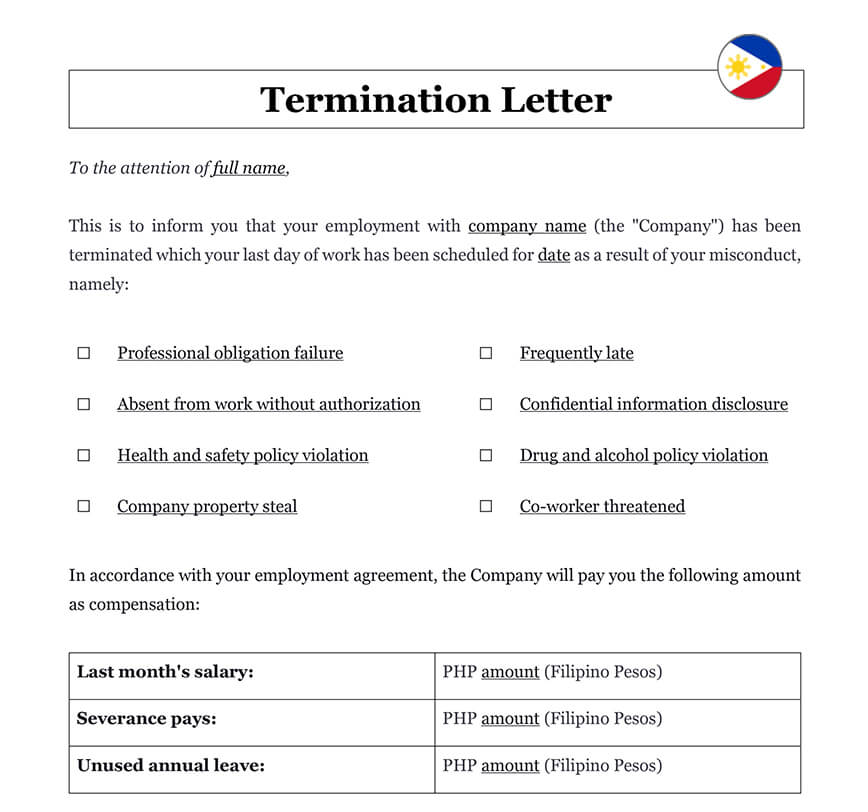
This Employment Termination Letter helps you when faced with the difficult task of terminating someone. It provides important elements that help you avoid misunderstandings and disputes.

Word Document (.docx)

Ready to use legal template
Drafted by experienced lawyers
Compliant with Filipino law
Ready to use legal template
Compliant with Filipino law
Home › Employees › Employment termination letter
Notification of termination occurs at the end of the termination process. The Employment Termination Letter must be carefully drafted. It will serve as the basis for a possible dispute if the Employee decides to take the case to the labor court later. Our Employment Termination Letter includes the following grounds for termination: Failure to perform work duties, frequent lateness, absence from work without permission, disclosure of confidential information, violation of heath and safety policy, violation of drug and alcohol policy, Theft of company property and Threats to colleague. If you wish to inform an employee of misconduct or poor performance, you can also download an Employee Warning Letter.
An Employment Termination Letter in the Philippines is a document that serves as formal notice of the end of an employment relationship between an employer and an employee. It is a written record of the termination of an employee’s contract, which is typically provided by the employer to the employee.
The letter usually contains information about the reason for the termination, the effective date of termination, any remaining salary or benefits owed to the employee, and other important details related to the termination.
Employment termination letters in the Philippines are important for both employers and employees as they serve as a legal record of the termination of the employment contract. They also help to ensure that the termination process is fair and transparent, and that both parties are clear about their rights and obligations.
Terminating an employee in the Philippines can be a complex process that involves legal and regulatory requirements. Here are the general steps an employer should follow to properly terminate an employee in the Philippines:
Reviewing the employment contract as well as labor laws and regulations is crucial to ensure that the employee’s termination is done in a legal and compliant way.
It is then necessary to document the reason and the recovery of evidence to support the licensing decision.
The company must arrange a meeting with the employee to inform them of the decision. During the meeting, the reasons for the dismissal must be explained in a clear and professional way.
The written letter of termination must include the reasons for the termination, the effective date, any remaining salary or benefits owned and any other relevant details.
It is essential to process the necessary paperwork such as the clearance and release documents required by the Department of Labor and Employment (DOLE).
The company shall pay the employee any compensation for which it is liable including any unused vacation or sick leave, final pay and separation pay if applicable.
The company must notify government agencies involved in the licensing process such as the Social Security System (SSS), the Philippine Health Insurance Corporation (PhilHealth), and the Home Development Mutual Fund (Pag-IBIG), as required by law.
In the Philippines, the rules governing Employee Termination Letters are outlined in the Labor Code of the Philippines. Here are some of the key rules to keep in mind:
1. Provide written notice: Employers must provide written notice to the employee of the grounds for termination. The notice should be clear and specific, outlining the reasons for the termination and the effective date.
2. Follow due process: Employers must follow due process, which includes giving the employee an opportunity to respond to the allegations and conducting an investigation if necessary.
3. Consider progressive discipline: Employers should consider progressive discipline, which involves a series of disciplinary measures leading up to termination. This allows the employee an opportunity to correct their behavior and avoid termination.
4. Comply with local labor laws: Employers must comply with local labor laws and regulations, including the Labor Code of the Philippines and any other relevant regulations.
5. Provide separation pay: If an employee is terminated without just cause, they may be entitled to separation pay. The amount of separation pay varies based on the length of service and the reason for termination.
6. Provide final pay and benefits: Employers must provide the employee with their final pay and any other benefits or compensation owed to them, such as unused vacation time.
It is important for employers to ensure that they comply with local labor laws and regulations when issuing an Employee Termination Letter. Failure to comply with these rules can result in legal action and financial penalties.